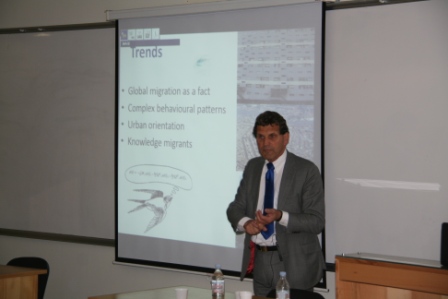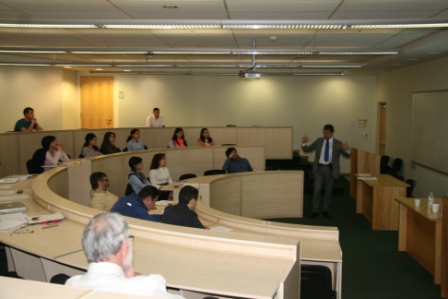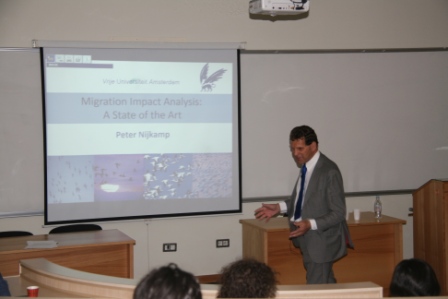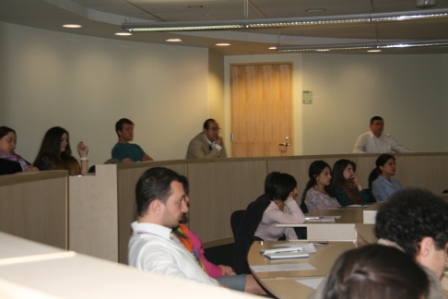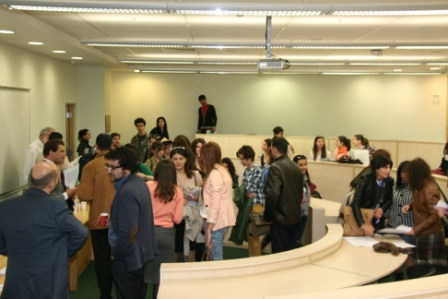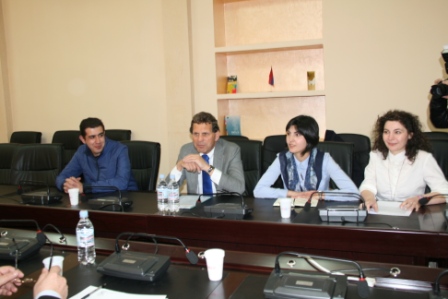
By invite and organization of RSAI Armenian section and financial support of Gulbenkian Foundation honorable professor of Vrije Universiteit, Amsterdam Dr. Peter Nijkamp visited Armenia on March 21th.
The purpose of this visit was to become acquainted with the scientific capacity of Armenia and to discuss among many things the possibility of bilateral cooperation with Armenian university.
During his one day visit professor had separate meetings with scholars of Armenian State University, American University of Armenia and Armenian State University of Economics.
The purpose of his visit was also to conduct public seminar on “International migration and regional development” for Armenian students and researchers in AUA (number of participants is around 40).
With the culmination of the visit came an understanding of further steps that should be taken, particularly has been agreed that in autumn of 2014 with support of Armenian universities international workshop will be organized. Also the team that will be responsible for organization of the workshop and will be decentralized from any institution was created during this visit and is composed from scholars of main universities of Armenian.
REPORT
From March 20-22, 2014 Peter Nijkamp has visited Armenia, with a view to the creation of an Armenian Section of the RSAI. This visit was a follow-up of earlier contacts established by Tomaz Dentinho. He visited three universities in the capital city Yerevan, the American University of Armenia, the State University of Yerevan, and the Armenian State University of Economics. The meeting was well prepared by the local organizer, Anahit Harutyunyan. Various meetings took place to seek for opportunities to reinforce regional science initiatives in the country and to come to the foundation for an official RSAI Section in Armenia. Several international workshops and teaching courses are foreseen in the coming year, so that the plan for an Armenian RSAI Section may materialize next year. Some Armenian representatives will also participate in the forthcoming ERSA conference in St. Petersburg (August 2014).


Migration Impact Assessment: New Horizons
Prof. Dr. Peter Nijkamp
Vrije Universiteit, Amsterdam
Abstract. Most countries of the world are increasingly affected by international migration: either as senders of emigrants, receivers of immigrants, or in many cases as both. The composition of the migrant population is often very different from that of the host population in terms of demographic, cultural and socio-economic characteristics. Migrant settlement is world-wide also predominantly concentrated in specific ‘attractor’ regions, in particular in metropolitan agglomerations of the developed world. The extent to which foreign migrants exert positive or negative long-range effects on the local, regional or national economy is, however, an underresearched topic in many counties. Broadly speaking, both sending countries and host countries have gained from two centuries of mass population redistribution and crossborder mobility is presently greater than ever before. However, in recent years there has been a growing backlash against the notion that international migration at current levels provides a net benefit to nation states. Migrant-sending countries are concerned about a ‘brain drain’ of highly qualified workers, while receiving countries worry that the ‘migrant absorption capacity’ has been exceeded, leading to detrimental economic outcomes and rising social tensions. Of course, there are clear parallels with the other dimensions of unprecedented global economic integration since 1980s, namely trade and capital mobility, of which the benefits and costs are also hotly debated. This paper discusses examples of a range of the scientific methods that are currently available to conduct Migration Impact Assessment (MIA). It also provides various case studies that may assist in verifying and quantifying the societal consequences of international migration. We define MIA as the integrated application of scientific tools to trace the broad socio-economic impacts of cross-border migration and related policies. Clearly, the impacts of migration go beyond the socio-economic realm and include cultural, environmental, political, spiritual and strategic issues.

